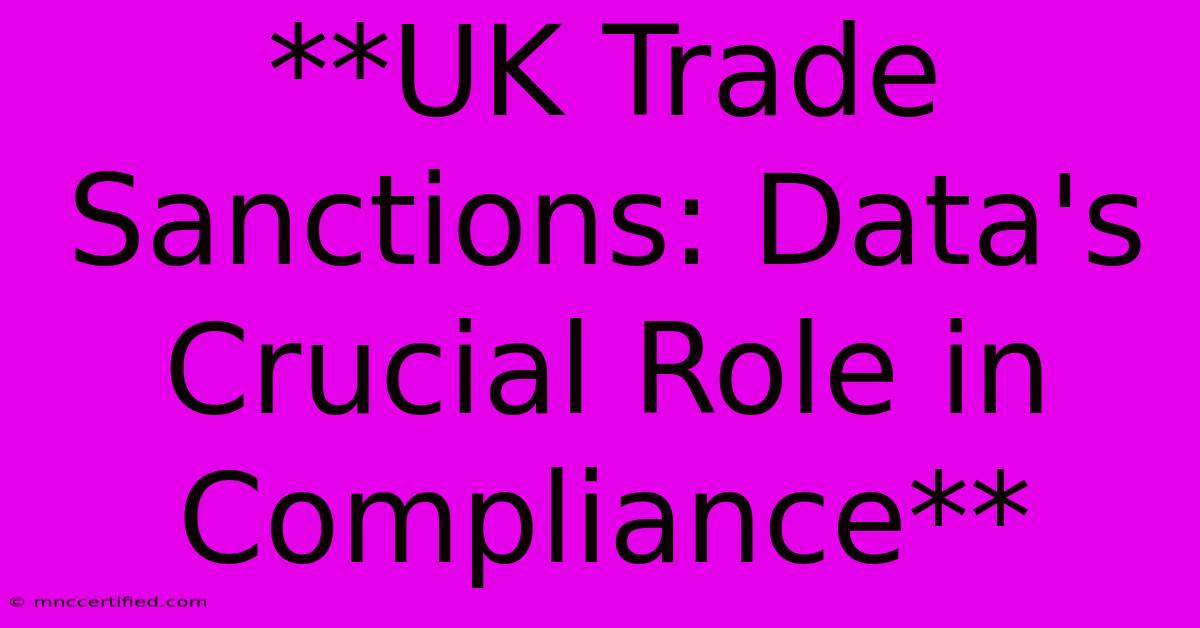**UK Trade Sanctions: Data's Crucial Role In Compliance**

Table of Contents
UK Trade Sanctions: Data's Crucial Role in Compliance
The UK's robust trade sanctions regime is a vital tool in promoting international peace and security, upholding human rights, and deterring illicit activities. However, navigating this complex landscape requires meticulous attention to detail, particularly when it comes to data management and compliance.
This article delves into the crucial role of data in ensuring compliance with UK trade sanctions. We'll examine the types of data required, the challenges businesses face, and strategies for successful implementation.
Understanding the UK Trade Sanctions Framework
The UK's sanctions framework encompasses a wide range of measures, including:
- Asset freezes: Restricting access to funds and financial resources of designated individuals and entities.
- Trade bans: Prohibiting the import or export of specific goods and services.
- Travel restrictions: Limiting movement of individuals to and from designated countries.
The framework is constantly evolving, with new sanctions being imposed and existing ones being amended. Therefore, staying informed and compliant is paramount.
Data Needs for Sanctions Compliance
Effective sanctions compliance hinges on the availability and accuracy of various data points. Key data types include:
- Customer due diligence (CDD): Verifying the identity and background of clients, including their nationality, address, and any connections to sanctioned entities.
- Transaction data: Tracking all financial transactions, including payments, transfers, and investments, to identify any potential breaches of sanctions.
- Supply chain data: Mapping the origin and destination of goods and services to ensure they are not sourced from or exported to sanctioned countries or entities.
- Employee data: Ensuring all employees are aware of sanctions requirements and have access to relevant training materials.
- Regulatory updates: Monitoring and updating sanctions lists and legislation to stay abreast of any changes.
Challenges of Data Management for UK Trade Sanctions
Businesses face a number of challenges when managing data for sanctions compliance:
- Data volume and complexity: The sheer volume and complexity of data can be overwhelming, making it difficult to identify and analyze potential risks.
- Data silos: Data is often fragmented across different systems and departments, hindering comprehensive analysis and risk assessment.
- Data quality: Inaccurate or incomplete data can lead to false positives or missed risks, potentially jeopardizing compliance efforts.
- Changing sanctions landscape: The dynamic nature of sanctions requires continuous monitoring and adaptation of data management processes.
Strategies for Successful Data Management
To overcome these challenges and ensure effective sanctions compliance, businesses can adopt the following strategies:
- Centralized data platform: Establishing a central repository for all relevant data, providing a single source of truth for analysis and reporting.
- Data quality assurance: Implementing robust data validation and cleansing procedures to ensure accuracy and completeness.
- Advanced analytics: Leveraging data analytics tools to identify patterns and anomalies, potentially indicating sanctions breaches.
- Automated screening tools: Employing software solutions to automatically screen transactions, customer data, and other relevant information against sanctions lists.
- Employee training: Equipping employees with the knowledge and skills necessary to understand and implement sanctions compliance procedures.
Conclusion
Data plays a pivotal role in achieving compliance with UK trade sanctions. By implementing effective data management strategies, businesses can navigate the complexities of the sanctions landscape, mitigate risks, and safeguard their reputation. Investing in robust data infrastructure and skilled personnel is essential to ensure ongoing compliance and mitigate potential legal and reputational repercussions. Remember, proactive data management is not just about compliance; it's about ensuring ethical and responsible business practices within the global trade environment.

Thank you for visiting our website wich cover about **UK Trade Sanctions: Data's Crucial Role In Compliance**. We hope the information provided has been useful to you. Feel free to contact us if you have any questions or need further assistance. See you next time and dont miss to bookmark.
Featured Posts
-
Legal Cases Outcomes For Pending Matters
Nov 07, 2024
-
Watch Club America Vs Pachuca Live Stream And Tv
Nov 07, 2024
-
Contractor Estimate For Insurance Company
Nov 07, 2024
-
Starmer Backs Foreign Secretarys Trump Remarks
Nov 07, 2024
-
Investment Partnership Accounting Software
Nov 07, 2024